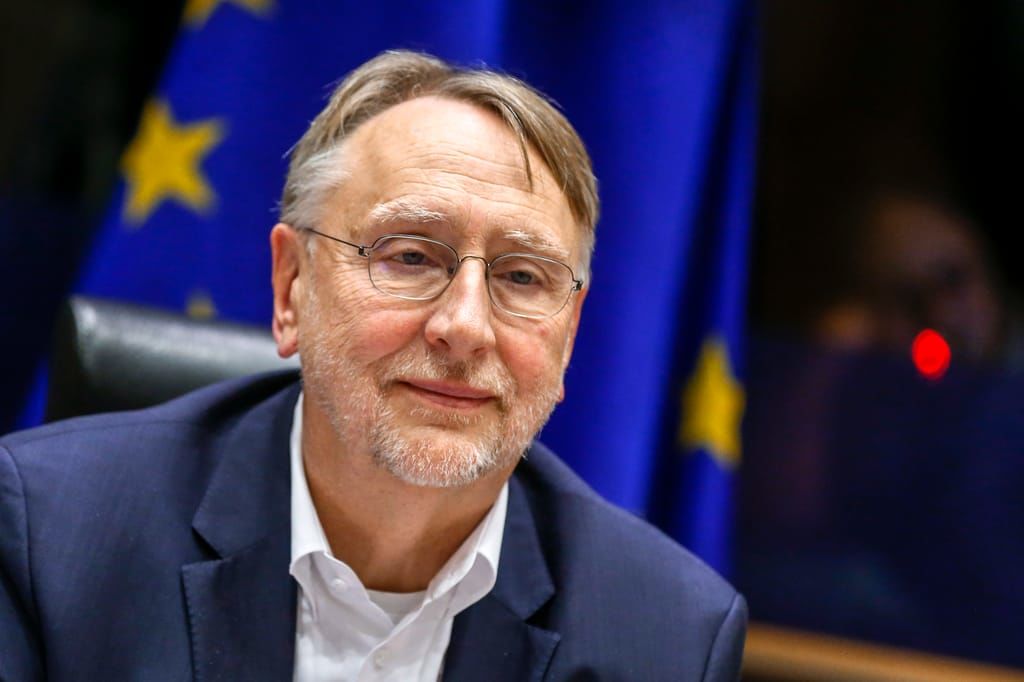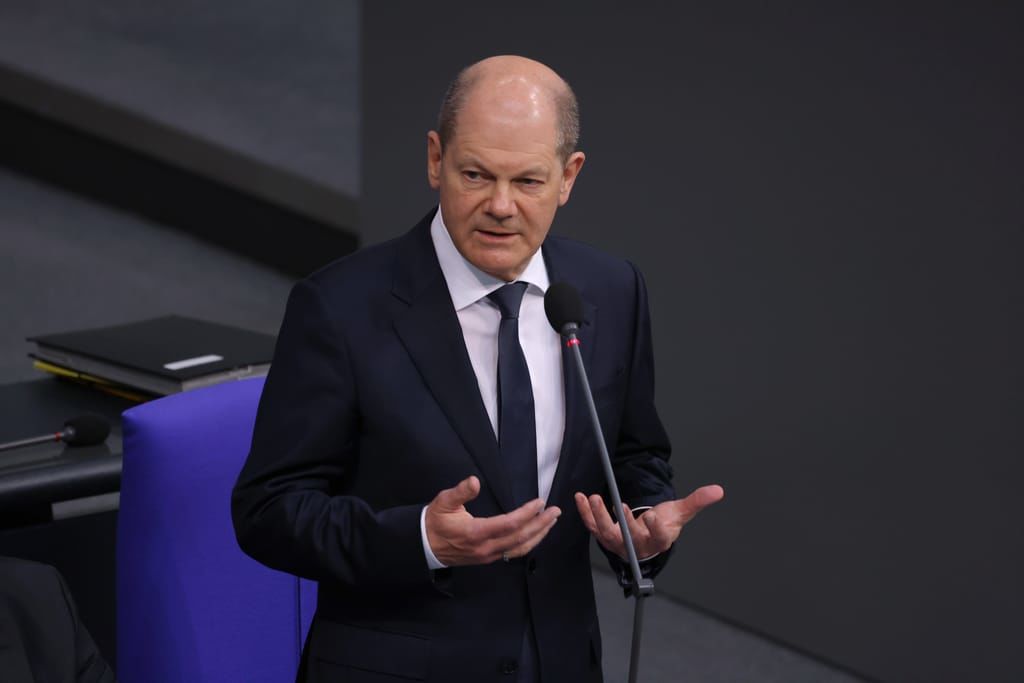
Germany mulls breaking subsidy taboo to avoid trade war with Biden
With only six weeks to avoid a transatlantic trade showdown over green industries, the Germans are frustrated that Washington isn't offering a peace deal and are increasingly considering a taboo-breaking response: European subsidies.
Europe's fears hinge on America's $369 billion package of subsidies and tax breaks to bolster U.S. green businesses, which comes into force on January 1. The bugbear for the Europeans is that Washington's scheme will encourage companies to shift investments from Europe and incentivize customers to "Buy American" when it comes to purchasing an electric vehicle — something that infuriates the big EU carmaking nations like France and Germany.
The timing of this protectionist measure could hardly be worse as Germany is in open panic that several of its top companies — partly spurred by energy cost spikes after Russia's invasion of Ukraine — are shuttering domestic operations to invest elsewhere. The last thing Berlin needs is even more encouragement for businesses to quit Europe, and the EU wants the U.S. to cut a deal in which its companies can enjoy the American perks.
A truce seems unlikely, however. If this spat now spirals out of control, it will lead to a trade war, something that terrifies the beleaguered Europeans. While the first step would be a largely symbolic protest at the World Trade Organization (WTO), the clash could easily slide precipitously back toward the tit-for-tat tariff battles of the era of former U.S. President Donald Trump.
This means that momentum is growing in Berlin for a radical Plan B. Instead of open tariff war with America, the increasingly discussed option is to rip up the classic free-trade rulebook and to play Washington at its own game by funneling state funds into European industry to rear homegrown green champions in sectors such as solar panels, batteries and hydrogen.
France has long been the leading advocate of strengthening European industry with state largesse but, up until now, the more economically liberal Germans have not wanted to launch a subsidy race against America. The sands are now shifting, however. Senior officials in Berlin say they are increasingly leaning toward the French thinking, should the talks with the U.S. not lead to an unexpected last-minute solution.
Berlin is the 27-nation bloc's economic powerhouse, so it will be a decisive moment if Berlin ultimately decides to throw its might behind the state-led subsidy approach to an industrial race with the U.S.
Running out of time
The clock is ticking for a truce with Biden that looks increasingly unlikely.
Recent attempts by a special EU-U.S. task force to address EU concerns have met little enthusiasm on the American side to amend the controversial legislation, the European Commission told EU countries this week.
"There are only a few weeks left," warned Bernd Lange, the chair of the European Parliament's trade committee, adding that "once the act is implemented, it will be too late for us to achieve any changes."
Lange said that the failure to reach a deal would likely trigger a WTO lawsuit by the EU against the U.S., and Brussels could also strike back against what it sees as the discriminatory U.S. subsidies by imposing punitive tariffs. Warnings of a trade war are already overshadowing the runup to a high-level EU-U.S. meeting in Washington on December 5.
 MEP Bernd Lange Lange said that the failure to reach a deal would likely trigger a WTO lawsuit by the EU against the U.S.
MEP Bernd Lange Lange said that the failure to reach a deal would likely trigger a WTO lawsuit by the EU against the U.S.
It's precisely the kind of spat that the German government wants to avoid, as Chancellor Olaf Scholz hopes to forge unity among like-minded democracies amid Russia's war and the the increasing challenges posed by China. Earlier this month, Scholz's government made an overture to Washington by suggesting that a new EU-U.S. trade deal could be negotiated to resolve differences, but that proposal was quickly rejected.
There are sympathizers for the subsidies approach in Brussels, with officials at the EU's executive saying powerful Internal Market Commissioner Thierry Breton is a leading proponent. Breton is already advocating for a "European Solidarity Fund" to help "mobilizing the necessary funding" to strengthen European autonomy in key sectors like batteries, semiconductors or hydrogen. Support from Germany could help Breton win the upper hand in internal EU strategy discussions over the more cautious Trade Commissioner Valdis Dombrovskis.
Breton will travel to Berlin on November 29 to discuss the consequences of the Inflation Reduction Act as well as industrial policy and energy measures with Scholz's government.
The German considerations even echo calls from top officials of the Biden administration, including U.S. Trade Representative Katherine Tai, who are urging the EU to not engage in a transatlantic trade dispute and instead roll out their own industrial subsidies; a strategy that Washington also sees as way to reduce dependence on China.
Plan B
Scholz first indicated late last month that the EU might have to respond to the U.S. law with its own tax cuts and state support if the negotiations with Washington fail to reach a solution, lending support to similar plans articulated by French President Emmanuel Macron, who will meet Biden on December 1 in Washington.
Although Scholz does not endorse Macron’s framing of the initiative as a "Buy European Act" (which sounds too protectionist for the Germans), the chancellor agrees that the EU cannot stand by idly if it faces unfair competition or lost investments, people familiar with his thinking said late last month.
Negative economic news, such as carmaker Tesla putting plans for a new battery factory in Germany on hold and instead investing in the U.S., or steelmaker ArcelorMittal partly closing operations in Germany, have increased calls in Berlin to consider more state support to counter a negative trend caused by both the U.S. scheme and high energy prices.
Although the official government line remains that Berlin is still holding out hope for a negotiated solution with Washington, officials in Berlin say that it could be possible to increase incentives for industries to locate the production of green technologies in Europe.
A spokesperson for the German Economy Ministry said that faced with the challenges stemming from the Inflation Reduction Act, “we will have to come up with our own European response that puts our strengths first … The aim is to competitively relocate green value creation in Europe and strengthen our own production capacities.”
The spokesperson warned, however, that both the U.S. and EU “must be careful that there is no subsidy race that prevents the best ideas from prevailing in the market,” and added: "Green technologies in particular thrive best in fair competition; protectionism cripples innovation."
One important condition that could help Germany and the EU to safeguard said fair competition and to avoid the global free trade system descending into protectionist tendencies would be to ensure that any EU state subsidies remain in line with WTO rules. That means, in contrast to the U.S. law, that those subsidies would not discriminate between local and foreign producers.
 German Chancellor Olaf Scholz first indicated late last month that the
EU might have to respond to the U.S. law with its own tax cuts and state
support
German Chancellor Olaf Scholz first indicated late last month that the
EU might have to respond to the U.S. law with its own tax cuts and state
support
Crucially, support is also coming from German industry.
"In the area of industrial policy and subsidies, we could look at measures that are compatible with WTO rules — as the EU is already doing in the chip sector," said Volker Treier, the head of foreign trade at the German Chamber of Commerce.
Treier also stressed that "there must be no discrimination" against foreign investors, but added: "This explicitly does not rule out the possibility of settlement bonuses, which in turn should be available to investors from all countries who would be interested in such investment commitments in Europe."
In Brussels, the Commission's competition department has also made clear that it's looking with an open mind at upcoming proposals.
"There are no instruments excluded a priori" when it comes to the EU's response to the U.S. subsidies, the department's state aid Deputy Director General Ben Smulders said Thursday.











